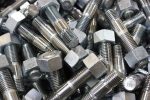SAE bolts are standard fastener sizes used on cars and trucks. They’re measured in inches and fractions of an inch. Most socket wrench sets come with both SAE and metric sizes to cover all repair needs.
Bolts have special markings on their heads that tell you the strength level they’re designed to hold. These strengths are based on the properties of the metal they’re made from.
Grade 2
Grade 2 bolts are a lower strength bolt that can be used in general non-critical applications. They are made of low to medium carbon steel and have a proof load of 57000 psi and a yield strength of 74000 psi. They do not have any radial lines and can be identified by their flat head.
Grade 5 bolts are a higher strength bolt that can be used in more critical applications. They are made of medium carbon steel that is case hardened. They are a good choice for high temperature and pressure applications. They have a proof load of around 640,000 psi and a yield strength over 60,000 psi. These bolts are also known as hex bolts.
These bolts are made of medium-strength carbon alloy steel and have been quenched and tempered. They are a good choice for demanding applications, such as automotive suspensions. They can withstand loads of up to 150,000 psi, which is more than double the tensile strength of a grade 2 bolt.
A bolt’s strength level is determined by its tensile strength and the number of times it can be stretched before it deforms permanently. These values are measured using a tensile test. Bolts with the highest strength levels are usually marked with a special symbol on their heads or a raised number of dashes on the shaft.
Grade 5
Generally speaking, the higher the grade of bolt you choose, the more strength it offers. This is because the stronger a bolt is, the more it can handle a given amount of stress before failing or breaking. Marsh Fasteners carries many different grades of bolts to cover most applications. The easiest way to determine which bolt is best for you is by looking at the head of the fastener. The head will be marked with a number that indicates the grade.
For example, a bolt with a head marking of A2-70 represents a stainless steel bolt of a certain tensile strength. The first number before the decimal identifies the minimum tensile strength of the bolt, while the number after it identifies the corrosion resistance.
As a rule of thumb, the higher the grade of bolt you select, the more demanding your application will be. For instance, a grade 12.9 bolt offers the most strength possible and is often used in manufacturing, construction and repair applications to join large structural components. Grade 12.9 bolts are also able to endure environmental conditions that would normally corrode other types of bolts, such as salt water and many other exterior conditions. The hex head of a grade 12.9 bolt also provides more bearing and wrenching surface than other types of fasteners can provide, making them the clear choice for heavy duty applications.
Grade 8
Bolts are available in a wide range of grades, which typically indicate the fastener’s tensile strength. According to Marsh Fasteners, this tensile strength is important because it allows the bolt to stretch and absorb operational stresses before the shear point is reached. The ability of the bolt to do this means that it will not damage suspension components during operation.
Grade 8 bolts are made from medium-strength carbon alloy steel and have a maximum tensile strength of 150,000 psi. They can be found in a number of applications that require heavy-duty fasteners, including military and automotive engineering. They are also used in applications where the operating environment is highly rugged or extreme.
A key difference between grade 8 and other grades of bolts is that they are manufactured from high-quality carbon steel. This means that they can withstand higher levels of stress, which makes them suitable for use in harsh conditions. In addition to this, grade 8 bolts are plated with zinc to provide additional corrosion resistance. They are also often provided with a threaded hex head, which can make them easier to install in tight spaces. These features make them a great choice for many industrial applications. When selecting a bolt, you should always read the product specification carefully to ensure that it meets your needs.
